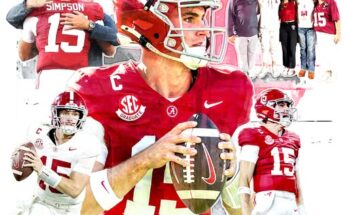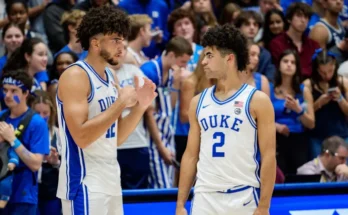Archie Griffin: The Greatest College Football Player of All Time, Surpassing Legends Earl Campbell, Tim Tebow, and Herschel Walker
In the storied history of college football, many names stand out as icons of the game, athletes who have left indelible marks on the sport and inspired generations of players and fans alike. Among these legends, Archie Griffin’s name shines with a unique brilliance. Griffin, an Ohio State University star, is widely regarded as the greatest college football player of all time, a title that has been debated for decades and contested by other phenomenal athletes such as Earl Campbell, Tim Tebow, and Herschel Walker. But what makes Archie Griffin’s legacy so special? How does he stand apart in a realm populated by so many extraordinary talents? The answer lies not just in his statistics or awards but in the context of his achievements, his consistency, his character, and the impact he had on the game and its culture.
Archie Griffin’s name is synonymous with college football greatness primarily because of his unprecedented accomplishment of winning the Heisman Trophy twice, an honor awarded annually to the most outstanding player in college football. This feat alone sets him apart from nearly every other player in history. While several athletes have won the Heisman once and others have come close, Griffin’s back-to-back victories in 1974 and 1975 remain unparalleled. This achievement alone places him in a category by himself and sets the foundation for his claim as the greatest college football player of all time.
But to fully appreciate Griffin’s place in college football history, it’s necessary to understand the magnitude of his performance on the field. Playing as a running back for the Ohio State Buckeyes, Griffin showcased remarkable versatility, durability, and vision. Over his collegiate career, he rushed for over 5,500 yards, a staggering total for his era, displaying a rare combination of speed, power, and agility. His running style was methodical yet explosive, capable of breaking through the toughest defenses while maintaining exceptional balance and control. Griffin was a workhorse for the Buckeyes, known for his relentless drive and ability to perform under pressure, attributes that made him a consistent threat every time he touched the ball.
What makes Griffin’s career even more extraordinary is the era in which he played. The mid-1970s was a period marked by physical, defensive-minded football. Running backs faced brutally aggressive defenses, with less protective rules for offensive players than today. Griffin’s ability to not only survive but dominate in such a physically demanding environment underscores his toughness and football IQ. It’s also important to note that Griffin played in a system that did not rely solely on individual statistics but emphasized teamwork and a balanced offensive attack. This context means his achievements came without the overwhelming individual focus that some modern players benefit from, making his production and accolades all the more impressive.
Comparing Archie Griffin to other legendary figures such as Earl Campbell, Tim Tebow, and Herschel Walker is essential in understanding his place at the pinnacle of college football. Earl Campbell, a powerhouse running back for the University of Texas, was renowned for his physical dominance and electrifying style. Campbell’s style contrasted with Griffin’s more balanced and strategic approach, but both were undeniably dominant in their own rights. Campbell won the Heisman in 1977 and had a significant impact on the game, but Griffin’s back-to-back Heisman trophies and sustained excellence over four seasons give him the edge in the college football discussion.
Tim Tebow, the University of Florida quarterback, brought a different dimension to greatness. Tebow’s leadership, athleticism, and ability to inspire were monumental. He won the Heisman in 2007 and led his team to multiple national championships, carving out a legacy as one of the game’s most respected and well-rounded players. Tebow’s style, blending passing and rushing, revolutionized the quarterback position, and his cultural impact extended far beyond the field. Yet, when strictly measuring college football greatness, especially in terms of individual accolades and the difficulty of sustained elite performance, Griffin’s dual Heisman wins and his record-breaking consistency at a premier program give him an edge.
Herschel Walker, another running back legend from the University of Georgia, is often considered one of the most physically gifted players in college football history. Walker combined power, speed, and endurance in a way that overwhelmed defenses during his collegiate career. He won the Heisman in 1982 and was a force on the field, setting multiple records and dominating the Southeastern Conference. However, Herschel’s career, though spectacular, did not include multiple Heisman wins, and his statistical achievements, while impressive, do not eclipse Griffin’s overall contribution to Ohio State football and college football history at large.
Beyond individual comparisons, Archie Griffin’s impact on Ohio State University is profound and enduring. He is not just a player but a symbol of Buckeye pride and excellence. Griffin’s leadership and performance elevated the Ohio State football program, helping it maintain national prominence and inspiring countless players who followed. His career demonstrated the power of consistency, humility, and hard work. Unlike some athletes whose legacies are defined by a few spectacular moments, Griffin’s greatness was built on sustained effort and excellence, season after season. This longevity and dedication resonate deeply with fans and analysts alike.
In addition to his athletic prowess, Archie Griffin’s character and contributions off the field enhance his legacy. Griffin has been a respected ambassador for college football, known for his humility, sportsmanship, and commitment to giving back to the community. His post-collegiate life has included involvement in business, philanthropy, and mentoring young athletes, showing that his greatness extends beyond the gridiron. This holistic impact is part of what elevates Griffin above many other legends, making him not only the greatest college football player by statistical measures but also by his influence on the sport’s culture.
Critics might argue that football greatness should be measured solely by professional success or media impact, pointing to the NFL careers of players like Campbell and Walker or Tebow’s media presence. However, the title of “greatest college football player of all time” requires a focus on collegiate accomplishments and influence. Griffin’s unparalleled collegiate resume, including two Heisman trophies, multiple All-American honors, and consistent team success, makes a compelling case that cannot be overshadowed by professional or post-college endeavors.
Furthermore, Archie Griffin’s style of play and success helped pave the way for future generations of running backs and college athletes. He exemplified a blend of grace and grit, showing that sustained excellence comes from preparation, mental toughness, and a deep understanding of the game. His legacy has influenced coaching strategies and player development programs, contributing to the evolution of college football into the highly competitive and tactical sport it is today.
In summary, Archie Griffin’s place as the greatest college football player of all time is well-earned and supported by his extraordinary achievements, his ability to perform at the highest level consistently, and his lasting impact on the sport. Surpassing other legends like Earl Campbell, Tim Tebow, and Herschel Walker is no small feat, but Griffin’s unique combination of back-to-back Heisman trophies, resilience in a challenging era, leadership, and exemplary character set him apart. His story is not just about athletic dominance but about what it means to be a true collegiate athlete, embodying excellence on and off the field. For these reasons, Archie Griffin remains an enduring symbol of college football greatness, a standard against which all others are measured.



